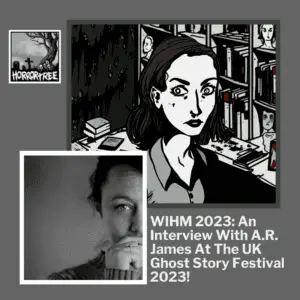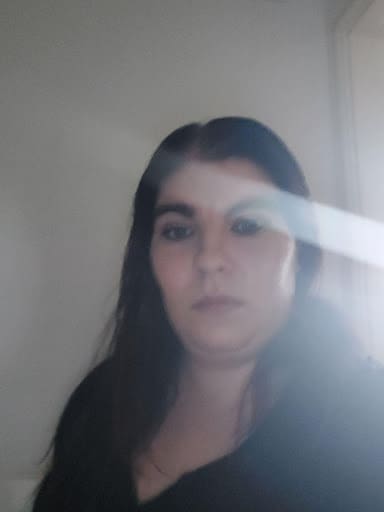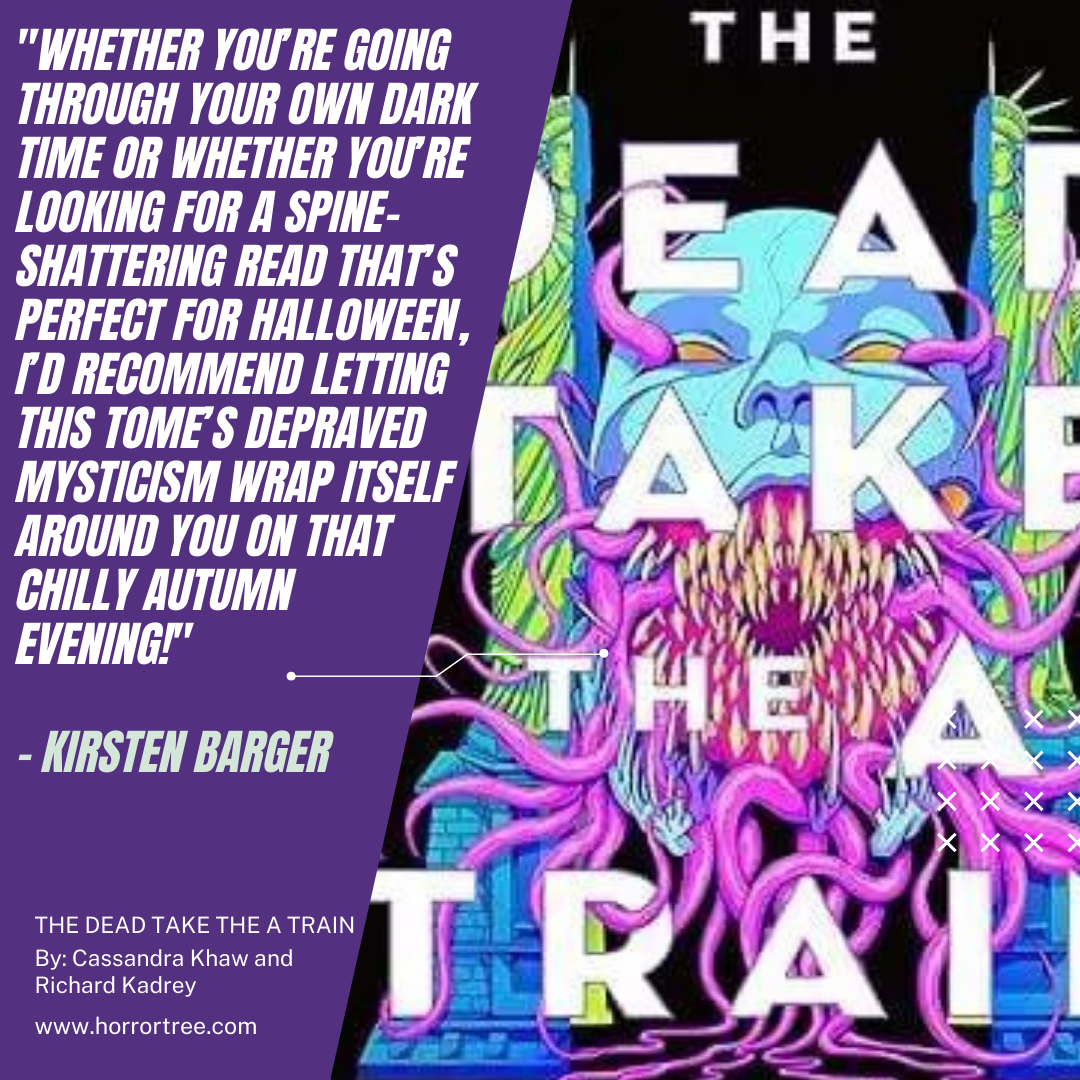WIHM 2023: An Interview With A.R. James At The UK Ghost Story Festival 2023!

2023 was my first year attending the UK Ghost Story Festival in Derby, which began Thursday 16th, Feb and ended Sunday 19th, Feb. The festival is one of a kind in Britain, so unsurprisingly it gathered an enthusiastic crowd with its packed programme of 33 speakers. Amongst them was A.R. James, who I was lucky to be introduced to (thanks, Lauren!).
A.R. James is a queer, bisexual actor-writer of unsettling entrances and exits in many fiction forms such as flash, screen-plays, and scripts; co-founder of Sonnet Sisters, Six Lips Theatre, and The Podvangelist. Her existing works include Unknown (Stairwell Books), Little Irritants (Analog Submission Press), and 100 Friggin’ Poems.
If you couldn’t attend the UK Ghost Story Festival this year, then you are in luck, for I caught up with A.R. James to discuss and reminisce about the festival.
Corinne: Looking at your bio and your WordPress page, you have many publications in poetry, flash, memoir, and scripts in genres such as feminism and history, and I wondered how your writer’s journey led you to take part in the UK Ghost Story Festival?
A.R: I’ve written, acted, and devised stories for as long as I can remember – the first ghost story I can remember telling was ‘The Time Machine,’ a flesh-pink-acrylic-paint-on-hardboard number featuring glitter pens and a masking-tape spine. I can only imagine it was inspired by both Jurassic Park and Sister, Sister, because it involved twins, dinosaurs, and time travel, and some people disappearing in the present after being eaten in the past.
At university, I wrote lots of sketches and short plays to perform with the drama society, and short stories for my English Literature modules. After that, I set up a theatre company and continued making short films and writing for performance. I like being busy, doing different things, and when lockdown happened, I was furloughed. During that time, I co-wrote my poetry pamphlet ‘Unknown’ with Elizabeth Chadwick Pywell. I joined The London Writers’ Salon and met Lauren McMenemy, through whom I found Horror Tree and the UK Ghost Story Festival. I had an absolute blast at my first UKGSF in 2021 and followed organiser Alex Davis’s events since. During last autumn’s Shadows Seasons horror writing course, Ally Wilkes delivered a talk on publishing in Horror. Having attended that and, shortly before, FantasyCon, I was keen to find a place as writer in residence at a genre literature festival. I proposed the idea to Alex, and, reader, I convinced him…
Corinne: What were your favourite moments from the festival?
A.R: Emma Stonex’s (‘The Lamplighters’) and Laura Purcell’s (‘The Silent Companions’) interviews were great fun – Lauren interviewed Emma and they had a fantastic vibe. Laura was really knowledgeable and passionate about her subjects, including theatrically-named trapdoors. Ally Wilkes ran a workshop on ‘Landscape and Location in Horror’, where we delved into haunted environments with a nicely curated set of prompts. I also loved the workshops I facilitated – ‘Ghost and Comedy’ and ‘Ghostly Origins.’ – the participants were super engaged and contributed some wonderfully exciting ideas that I can’t wait to read in full.
Corinne: How did your workshops go, and what were their aims?
A.R: In ‘Ghosts and Comedy,’ we explored some different types of humour and how they function in ghost stories. We looked at some examples, what people find funny and why, and how to incorporate humour into your own stories. Both ghost stories and humour can be very particular subjects of personal taste, so my aim was just to open up a few possible lenses through which to play with them together.
In a panel at UKGSF 2021, Laura Mauro said, “A ghost is a trauma revisited,” and this stuck with me. In Ghostly Origins, I aimed to explore a few examples of ghosts from existing media, the trauma they came from within and without the stories, the nature of their manifestation, and their longevity.
Corinne: Were there any workshops you would happily retake?
A.R: ‘Landscape and Location in Horror’ with Ally Wilkes, which I mentioned, as well as ‘Tapping Into Your Own Ghosts’ with Megan Taylor. Megan’s exercises had us mining personal fears, engaging memory through the senses, and deployed enigmatic prompts such as finding an odd item on the beach or receiving an anonymous telephone call.
Corinne: Did you learn any new pearls of wisdom from the festival?
A.R: When asked about editing, Laura Purcell said, “Yeah, it’s hard. Suck it up,” which was refreshing!
Corinne: What was the impact of being the Ghost of Festival Present? What did this mean for you?
A.R: I initially imagined the role to consist of some live tweeting of the events. Alex was very open to suggestions and welcomed the idea of a creative response to share at the end. He invited me to run some workshops, and I suggested the open mic slots as we had so many workshops where people would be generating new work of their own. As well as being a rewarding experience, the role gave me some exposure and recognition in the genre. I would love to do it again and would love to see how the Ghost of Festival Future makes it their own.
Corinne: Your creative response to the festival, ‘10/10 would Haunt Again’, is now available on the UK Ghost Story Festival blog, and I took a look. I loved the line, “Genre people are the best.”
A.R: That’s a direct quote from multiple people over the weekend, and it formed a strong part of the vibe of the festival. People were so excited and game, brought together by the simple pleasure of being a bit spooky. C.J. Cooke nicely encapsulated the joyful urge of “peel back the carpet and find the goo underneath.” Horror is a very special community and genre, and it was an important note to capture in my creative response.
Corinne: For Horror Tree, we are celebrating Women in Horror Month – do you have any favourite female horror authors?
A.R: Charlotte Perkins Gilman is best known for ‘The Yellow Wallpaper’ but also has a very fun little ghost story called ‘The Rocking Chair’ about two men who catch fleeting glimpses from the street of a golden-haired girl in their lodging room. Emily Carroll is an illustrator and writer doing ingenious things with form, especially in ‘His Face All Red.’ The story appears in her collection ‘Through the Woods,’ but I first read it online, clicking through from panel to panel. The reveal delivered in that more engaged, autonomous way gave me shivers. Other fantastic collections include ‘The Dangers of Smoking in Bed’ by Mariana Enríquez and ‘I Spit Myself Out’ by Tracy Fahey.
Corinne: What are your thoughts on Women In Horror Month?
A.R: It’s very exciting that it’s being platformed. Every month is Women in Horror Month for me.
Corinne: What are you currently working on?
A.R: I can’t say too much, but I’m working on a couple stand-alone ghost stories, featuring strawberries, hogweed, and photography. I’m interested in honing my craft and bringing something new to ghost stories. The fun for me is in the characterisation and personality of the story.
Corinne: Do you have any advice for female horror writers?
A.R: It’s a bit presumptuous of me to give anyone advice as I’m so early in my career, but if you are a woman writing horror, then you are already in a warm, welcoming community – embrace it. Go to every event, join every community. Stick to your guns – write the thing, then find a home for it – there will be one. If there isn’t, you’ll make one. We’re good at that.
Also, use content warnings and use them in an informative way – both for your own reading, and for your readers. There are so many books I’d love to read but can’t because the information isn’t available. We owe a duty of care when releasing a book into the world. You want people to feel things when reading your writing, so accept that your words do have an impact. A list of broad topics doesn’t invite or accommodate readers with triggers. More women – and all writers – need to lead the way in this practice. Remember, your reader is a human being, horror is a broad genre, and you have the knowledge to enable informed consent. What would you say to a customer about your book, to enable them to engage with it? What would you say to a friend?
- About the Author
- Latest Posts
Corinne Pollard is a new disabled horror writer from West Yorkshire, UK with published works in Sirens Call eZine and Trembling with Fear. With a degree in English Lit and Creative Writing, Corinne has always enjoyed the world of dark fantasy. Aside from writing, Corinne enjoys metal music, visits to graveyards and shopping for books to read.
Twitter: @CorinnePWriter













